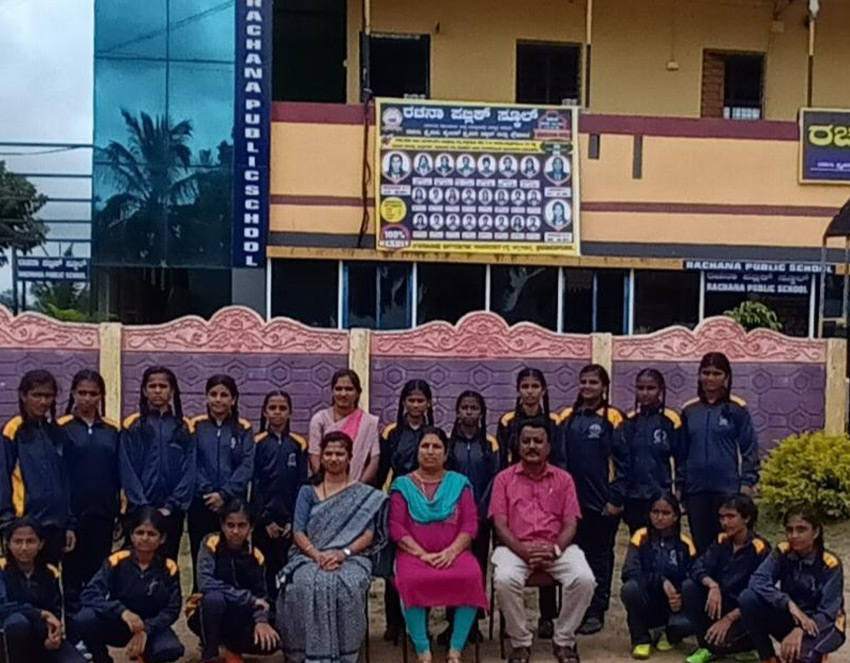
Prakash H T, Rachana Higher Primary School, Hassan, Karnataka
Establishing the ‘Adoption’ strategy
Every school has its own challenges, some of which are easy to overcome, while others are hard to break. But with courage and innovation, every challenge can be turned into an opportunity. This is the story of Prakash H T, the founder of four schools in his village, Hassan, Karnataka.
“I want every student to learn the basics and current concepts of their subjects,” claims the school leader of Rachana Higher Primary School, Hassan, explaining his vision for the school. The school leader wanted his students to be happy and successful. He wanted them to learn and grow. But he also knew that not every student had the same chance to achieve their potential. Some students come from poor or troubled backgrounds. Some students have learning difficulties or disabilities. Some students lack confidence or motivation. He knew that these students needed more than just regular teaching. They needed extra care and support. They needed someone who would believe in them and inspire them.
So Prakash built a strategy that would create a culture of learning and sharing for every student and teacher. That’s when he came up with the idea of ‘adoption’.
Adoption is more than just a strategy. It is a way of life for his school community. It means that each teacher adopts and mentors a few students who need special attention and guidance. They not only teach them the basics and current concepts of their subjects but also help them with their personal problems, emotional issues, and future goals. But that is not all. “In my school, it is not just the responsibility of the teachers to improve students’ learning; the students also play a part,” asserts Prakash. He also encourages senior-grade students to adopt and mentor lower-grade students who are struggling with their studies. They act as peer tutors, role models, and friends to their younger counterparts.
This way, every student has someone who cares for them, who understands them, who helps them grow.
It was not easy to implement this idea at first. Some parents were skeptical about letting their children be mentored by other students. Some teachers were reluctant to share their responsibilities with others, and some students were shy or resistant to opening up to their mentors.
But Prakash did not give up, and eventually, he saw the results. Students who were once left behind started catching up with their peers. Those who were once disinterested or discouraged became more curious and enthusiastic about their studies, and the ones who were once lonely or unhappy found new friends and support systems.
The school atmosphere changed from one of stress and competition to one of joy and collaboration. “I turned impossible into possible,” sighs the school leader with relief!
Milestone
Prakash is a civil engineering diploma graduate. He had a promising career ahead of him, but he wanted to give back to his community and improve the education of his fellow villagers. He wanted to make a difference. With the help of his relatives who were already in the education field, Prakash started a small school up to 7th grade in his village. He worked hard to provide quality education to his students, hiring qualified teachers and staff who shared his vision. And he didn’t stop there.
He expanded his school to include higher secondary education and helped students prepare for their future careers or higher studies. He then established an undergraduate college in his village. But life had other plans for him. Due to various untoward circumstances, he had to step down from the management of the higher institutions and settle down with schooling as his main focus.
“Currently, I own not one, but four schools within and around my village,” the school leader proudly states. Today, he provides quality education to hundreds of students in and around his village and is still making a difference.
Proud moments
The schools that Prakash has built are known for their holistic approach to education. He firmly believes that a child’s development should not be limited to textbooks and exams, but rather that students should be encouraged to explore their talents and interests and enjoy their school life.
Prakash is a man who leads by example. He is passionate about sports and believes that it is an integral part of a child’s growth. Once, he was determined to make sports a part of his school’s curriculum, and he succeeded. Starting with a small football team, he faced opposition in his taluk. The people there did not believe that girls could play football, and were not interested in supporting the team.
However, Prakash did not give up. He coached the team rigorously, and soon enough, the girls started to improve. They began winning games, and their confidence grew. Prakash was proud of his girls and believed that they had the potential to go far.
Finally, the team represented their taluk in a football tournament in Mangalore. Although they did not win the tournament, Prakash was proud of his team for their effort. He knew that this was just the beginning and that his girls’ football team had a bright future ahead of them.
“Building a school has its own challenges,” says Prakash. Despite difficulties like lack of communication skills among students, low parental support, and competition from nearby schools, he remains undeterred on the pathway to success. The continuous 100% result in the SSLC proves it.
Also Read: From A Farmerworker’s Son To Becoming A Proud Edupreneur
Bringing students back to school
Once the COVID-19 pandemic hit the world and months went by, it became clear to Prakash that bringing back students to school would be another challenge altogether. Many students had grown comfortable in their home environments and had lost interest in studying. The lack of proper guidance and access to learning, coupled with the fact that many students had been promoted to the next grade without any classes or examinations, had led to a decline in interest in returning to school.
“Getting students back to school and streamlining their academics became our main priority,” he firmly says. As a routine, the school regularly conducted 3 to 4 extracurricular activities every year. But in order to attract students and satisfy parents post-COVID, the school decided to up its game. They began conducting around 8 extracurricular activities, including market day, color day, fruit day, game day, vegetable day, and celebrations of regional festivals, amongst others.
The school soon witnessed the positive impact of this modification. The activities have created a newfound interest and curiosity in the students, encouraging them to learn and grow. It has also built an overall awareness amongst the students, without restricting them just to the school curriculum. As the world slowly starts to return to normal, the lessons learned by the school will stay with them forever. They have proven that even in the toughest of times, with a little creativity and perseverance, anything is possible.
Strategies to increase enrollment
The key to turning things around is to ensure that the school is known for its quality, whether it is in terms of infrastructure, facilities, or academics. Prakash recognizes that the satisfaction of both students and parents plays a crucial role in increasing enrollment. As a result, he sets about implementing some new parent engagement strategies.
“Increasing the connection between the principal and parents is one thing that I am planning to implement,” the school leader says. “Providing parents with a platform to communicate their issues regarding their wards and getting relevant solutions will definitely satisfy them. This will help propagate the school through word-of-mouth.”
The school leader has another strategy up his sleeve. Prakash plans to identify the various villages in and around the school and build awareness about it among the locals. “We have identified the villages where the school bus picks up students for school campaigning,” he explains.
Prakash is also entrusted with a crucial responsibility – identifying the siblings of current students and ensuring that they are admitted to the school. This is a critical step in ensuring the school’s continued success.
“When parents are satisfied with our school, they will tell others about it, and that’s the best form of advertising we can ask for,” he adds.
Varthana – Rachana: Past, Present and Future
Prakash has taken three loans so far and is utilizing them for school development, such as purchasing classroom furniture and computers. “Many institutions, especially schools in rural areas, could benefit from easy processing and financing with lower interest rates. Varthana’s academic solution services have been communicating and providing services without any hassle.”
When asked about what more Varthana can provide, Prakash tells us that “ideas to increase admissions, teacher awareness programs, and various marketing strategies” would be helpful for the holistic development of the schools.


